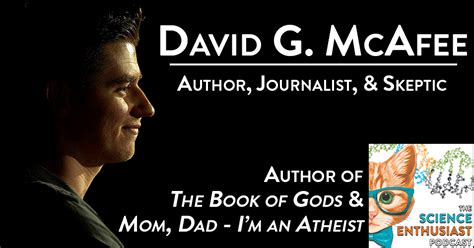A Quote by Fulton J. Sheen
All worry is atheism, because it is a want of trust in God.
Related Quotes
Let me tell you that atheism has never painted a masterpiece. Atheism has never dispelled fear. Atheism has never healed a disease; faith in God has, but not atheism. Atheism has never given anyone piece of mind. Atheism has never dried a tear. Atheism has never given an intellectual answer to the creation. Atheism is bankrupt and empty; it's brain dead.
You don't want atheism shoved down your throat? OK. We will stock knocking on doors spreading our 'Truth,' and having tax-exempt organizations dedicated to atheism that have influential political action committees. We will also stop printing 'In atheism we trust' on all US currency and saying, 'One nation, under atheism" in the pledge of allegiance. We will also stop insisting that everyone who disagrees with us will be sentence to eternal damnation... Wait...
Worry is anti-trust. If you're worried, you don't trust something: your kids, their friends, strangers, the church, even God. Can He take care of your children? Certainly. Jesus says, 'I tell you, stop being anxious and worried about your life.' Pretty blunt. Stop it! Easier said than done, huh? Worry tests your trust, so hand your children to God and let Him babysit your babies when you're not around. He's pretty good at it!
Some say Christianity is just a crutch. But let's turn the question on its edge for a moment. Is atheism an emotional crutch, wishful thinking? The ax cuts both ways. Perhaps atheists are rejecting God because they've had a bad relationship with their father. Instead of inventing God, have atheists invented non-God? Have they invented atheism to escape some of the frightening implications of God's existence? Think about it.
Remember always that there are two things which are more utterly incompatible even than oil and water, and these two are trust and worry. Can you call it trust, when you have given the saving and keeping of your soul into the hands of God, if day after day you are spending hours of anxious thought and questionings about the matter? When believers really trust anything, they cease to worry about the thing they have trusted.
I want atheism to be true and am made uneasy by the fact that some of the most intelligent and well-informed people I know are religious believers. It isn't just that I don't believe in God and, naturally, I hope that I'm right in my belief. It's that I hope there is no God! I don't want there to be a God; I don't want the universe to be like that.
The most dangerous type of atheism is not theoretical atheism, but practical atheism -that's the most dangerous type. And the world, even the church, is filled up with people who pay lip service to God and not life service. And there is always a danger that we will make it appear externally that we believe in God when internally we don't. We say with our mouths that we believe in him, but we live with our lives like he never existed. That is the ever-present danger confronting religion. That's a dangerous type of atheism.
Obviously, if theism is a belief in a God and atheism is a lack of a belief in a God, no third position or middle ground is possible. A person can either believe or not believe in a God. Therefore, our previous definition of atheism has made an impossibility out of the common usage of agnosticism to mean "neither affirming nor denying a belief in God."
But they that hold God to be [an incorporeal substance]do absolutely make God to be nothing at all. But how? Were they atheists? No. For though by ignorance of the consequence they said that which was equivalent to atheism, yet in their hearts they thought God a substanceSo that this atheism by consequence is a very easy thing to be fallen into, even by the most godly men of the church.





































